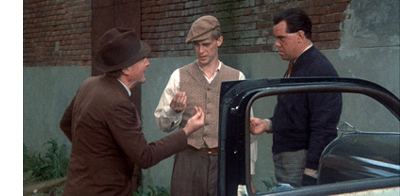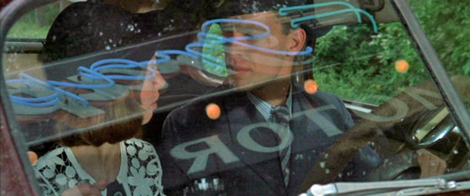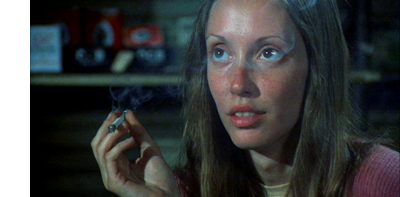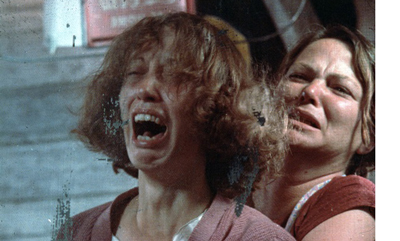Reviewed by Glenn Erickson
There was very little middle ground with Robert Altman; critics either loved his movies or hated them. His 1974 Thieves Like Us is considered a masterpiece by some and a bore by others. As is almost always the case, Altman's production generates a thoroughly convincing period atmosphere and his players are a fascinating collection of unusual personalities. The film is worth seeing just to appreciate the wonderfully eccentric actress Shelley Duvall. Viewers expecting a taut story may be disappointed, but Midwesterner Altman has other aims. His take on Edward Anderson's Depression-era crime novel produces an interesting tension of its own.

Bank robber T-Dub Masefield (Bert Remsen) springs his partner Chicamaw (John Schuck) from a prison farm along with convicted murderer Bowie Bowers (Keith Carradine), a relative innocent who went into jail at the age of 14. The trio hides out with T-Dub's sister Mattie (Louise Fletcher) and sometimes with Dee Mobley (Tom Skerritt), a crooked gas station owner. Mobley's daughter Keechie (Shelley Duvall) takes a shine to Bowie and doesn't seem to mind his life of crime. The three fugitives rob several banks. As they plan bigger capers; T-Dub takes up with the rather young Lula (Ann Latham) while the 'half breed' Chicamaw becomes bitter because he has no female companionship. Chicamaw murders two lawmen while freeing Bowie from a car crash. Keechie nurses Bowie. The young couple become lovers, but Bowie's partners are soon resentful of their commitment to one another. The rewards placed on the bandits' heads are a strong temptation for the people with whom they hide ... friends and relatives alike.
Edward Anderson's Thieves Like Us has inspired several filmmakers, most notably Nicholas Ray in his superb debut picture They Live by Night. That 1949 show starred Farley Granger and Kathy O'Donnell as star-crossed lover-fugitives "who were never properly introduced to the world." Other rural-bandit Romeo and Juliet movies followed, most notably Joseph H. Lewis' Gun Crazy. Arthur Penn's 1967 hit Bonnie & Clyde began a welcome trend toward more accurate period art direction in American movies. Thieves Like Us evokes the same 1930s Depression era, with F.D.R. on the radio and Coca-Cola selling for 5 cents. Robert Altman's long-lens shooting style adds a distancing effect, a kind of visual commentary on the past. But his vivid characters consistently cut through, with humor (Bert Remsen) and human immediacy (Keith Carradine). The fascinating Shelley Duvall impresses as simply an authentic individual, whose emotions are particularly transparent.

Nicholas Ray's original noir simplified Keechie and Bowie's story but Altman prefers to set his characters adrift in events that are never more than half-explained. The characterizations govern all. Entertaining eccentrics T-Dub and Chicamaw can turn murderous without much in the way of provocation. Yet they're also innocent yahoos - they never seem particularly concerned about being caught or even when they know how hot they are. It's a toss-up to decide whether these earthy yokels are hopelessly unintelligent, or if Altman simply refuses to impose filmic judgments on them. Chicamaw seems bitter about being a half-breed Indian and not having a woman of his own, but the film doesn't identify those tensions as the root cause of his habitual violence.
The source book characterized Keechie and Bowie as the innocent victims of a society that unfairly labels them as mad-dog fugitives. The script by Calder Willingham and Joan Tewkesbury lets them be what they are. Keechie is the ignorant daughter of a crooked mechanic and Bowie is a teen murderer who no longer cares who he might kill. Instead of being traumatized by Chicamaw's cold-blooded slayings or angry that the media are exaggerating his menace, Bowie just shrugs his shoulders. It's beyond his understanding. Altman likewise doesn't make the cops into representatives of a brutish society or a symbol of fate. They just do what they do. The police are not competent to find them on their own, but when good information comes their way the law doesn't mess around with legal formalities. They're cop killers, after all.

The heart of Thieves Like Us is Altman's greatest discovery, Shelley Duvall. At first sight she may seem ungainly, but she's such a beautiful and endearing person that we buy into every emotion she projects. Her Keechie becomes a loyal companion to Bowie, the soul of devotion. She rebels only when Bowie reneges on his promise to abandon his bank-robbing habits. The latter part of the film and its wrenching climax all belong to Keechie; she even triumphs over the woefully under-directed moment when Mattie tells her she's going to have a baby.
Altman underscores his characters with authentic audio from Depression-era radio shows. Some of the songs comment on the proceedings, as when the actions of our less-than-noble robbers are counterpointed by a radio drama's description of its dashing hero. This radio accompaniment is much smoother than the sarcastic loudspeaker announcements in Altman's M*A*S*H. Droll humor also prevails in the lame jokes that T-Dub and Chicamaw constantly throw at each other. T-Dub jokes and kids while he aggressively molests Lula. Bowie seeks to cheer up Keechie as well: "What's the Mississippi state tree? A telephone pole."
When the band of bank robbers eventually falls apart, it's as if the group has run out of punch lines. Bowie pays back his buddy Chicamaw for saving him after the car accident by busting him out of a prison farm. The sequence is almost comic in form. Chicamaw needlessly murders Al Scott's annoying prison warden and is such an annoyance in the car that Bowie just ditches him on the road.
 (Spoiler)
(Spoiler)
Edward Anderson envisioned Keechie and Bowie as martyrs of an unfeeling society. Nicholas Ray played his finale as high tragedy, emphasizing Mattie's Judas-like betrayal. The unhappy woman informs on the desperate Bowie and the pregnant Keechie in the hope of freeing her own husband from prison. Inexplicably, Altman leaves Mattie's specific motivation unexplained. Bowie disappears into a shack and is killed off-screen; Keechie screams in shock as Mattie restrains her from interfering with the faceless posse. Altman wants us to feel Keechie's anguish as happening in the here and now, without imposed moralizing or social messages. Yes, it's tragic that Bowie became a thief associated with killers. But there's no insistence that his fate was unjust.
The KL Studio Classics Blu-ray of Thieves Like Us replicates the special mood of this hazy, colorful vision of the past; this is one of Altman's best-looking movies. Cameraman Jean Boffety often films in Altman's preferred style of telephoto, shallow depth photography, but the visual plan is much richer than Altman's later 'hose down the set' approach. The movie has no conventional music score and instead chooses a sound design overloaded with that old-time radio audio.

The one extra is the full-length commentary from the late director, recorded in 1996. Watching the film again, Altman praises his cameraman, has little to say about Shelley Duvall and discusses his own career. In one nice passage he explains how he likes to let actors run through entire scenes without verbal direction or interruption, while running multiple cameras. With a cast this interesting and photogenic the method works fairly well but tends to produce static visuals. Altman likes Thieves Like Us quite a bit; he made it for United Artists, which rejected his script for Nashville. That film ended up being a big hit while Thieves Like Us did next to no business. The general run poster used for this disc's cover art is a comic bank robbery scene that looks like a bad take from Bonnie and Clyde.
On a scale of Excellent, Good, Fair, and Poor,
Thieves Like Us Blu-ray rates:
Movie: Very Good ++
Video: Excellent
Sound: Excellent
Supplements: Commentary from 1996; original trailer
Deaf and Hearing Impaired Friendly?
YES; Subtitles: None
Packaging: Keep case
Reviewed: December 9, 2014

Text © Copyright 2014 Glenn Erickson
See more exclusive reviews on the Savant Main Page.
Reviews on the Savant main site have additional credits information and are often updated and annotated with reader input and graphics.
T'was Ever Thus.
Return to Top of Page
|


